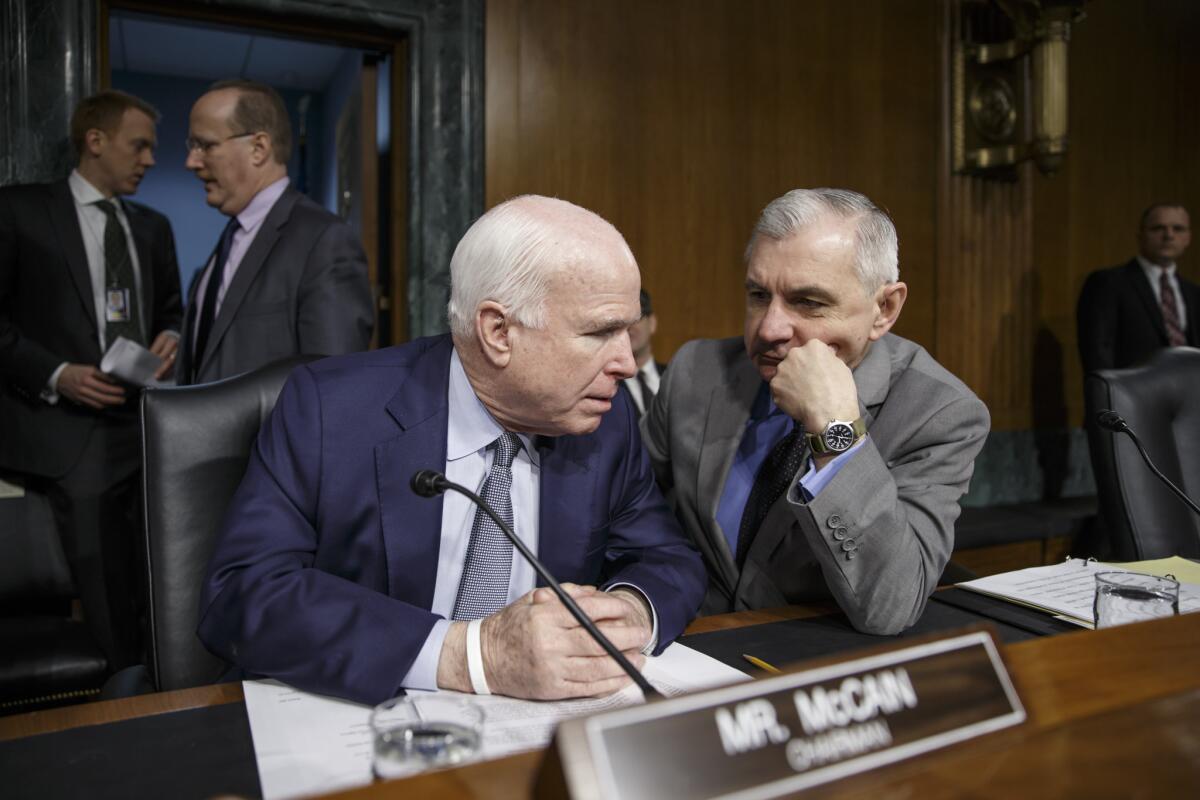Opinión: The paradoxical path from sequester cuts to a larger federal budget

GOP leaders of the House and Senate budget committees are due to release their budget outlines Tuesday for the fiscal year that begins Oct. 1, a hotly anticipated event in Republican circles. That’s because it’s the first time during the Obama presidency that Republicans will have full control over the process.
No doubt the proposals will look very different from the multiyear budget deals that House Republicans struck with Senate Democrats in 2011 and 2013. Nevertheless, the spending restraint in the proposals may be short-lived. Republicans may soon find themselves trying to roll back the automatic spending cuts imposed by the 2011 Budget Control Act, just as Democrats sought (successfully) in 2013.
Granted, the reason will be different this time. Some influential Republicans want to spend considerably more than the act provides for defense, while Democrats in 2013 were focused on pumping more money into the domestic side of the ledger.
Yet there’s little or no chance that Congress could waive the “sequester” cuts for one and not the other. Republicans can act pretty much unilaterally on the annual budget because it’s a joint resolution that Democrats can’t filibuster and President Obama can’t veto. The Budget Control Act, on the other hand, is a statute, and any bill to ease its automatic cuts will require the support of at least half a dozen Democrats and the White House.
The cuts are the result of the failure of House and Senate negotiators to come up with a “grand bargain” in 2011 to shrink cumulative deficits by $1.2 billion over a decade. They’re a mindless form of budget discipline, though, which is why lawmakers from both parties oppose them. The support comes from deficit hawks who don’t see any better way to hold down spending.
On Monday, Senate Armed Services Committee Chairman John McCain (R-Ariz.) and the committee’s top Democrat, Jack Reed of Rhode Island, announced that they would press for $577 billion in defense spending in fiscal 2016, or $78 billion more than allowed by the 2011 law. That’s the same amount that the Pentagon would have been budgeted had sequestration never gone into effect, they argued in a letter to the Senate Budget Committee.
McCain is hardly alone in his party in seeking to blow up the sequester. As Sen. Lindsay Graham (R-S.C.) told the New York Times, “There is a war within the Republican Party” over discretionary spending levels.
My colleague Lisa Mascaro in Washington said Republicans may declare a truce of sorts by passing a budget resolution with the legislative equivalent of an asterisk. The resolution would hew to the spending limits in the 2011 law but would also leave the door open to higher totals if cuts were found elsewhere in the federal budget.
It’s no secret where they’d look for those offsets. Many forms of so-called mandatory spending, such as Social Security, Medicaid and food stamps, are excluded from the sequester cuts, so lawmakers could trade reductions in these areas for increases in discretionary spending.
Such changes could conceivably be accomplished through a budget reconciliation bill, a process that does not allow filibusters. But such a measure would still require Obama’s signature to become law, and it’s hard to imagine him approving cuts in benefit programs solely to increase defense spending. Again, any move to waive the cuts would have to help domestic programs too.
One complicating factor is that Republicans are already counting on savings in at least some mandatory spending programs to help them eliminate the federal budget deficit over a certain amount of time, most likely 10 years. They’d have cut more deeply in order to offset any increases in discretionary spending. And while Democrats may agree to hold down entitlements to free up room for growth (or just avoid cuts) in domestic programs and infrastructure, they’ve shown little interest in cutting benefits for the sake of balancing the budget.
Top Republicans on the House Budget Committee also pledged to repeal the entire Affordable Care Act as part of their budget, including the roughly $700 billion in savings the act would achieve by cutting payments to some providers and insurers in the Medicare program. That means they’ll have to cut other entitlements even more severely to bring the budget into balance.
Good thing they don’t need any Democratic votes for the budget resolution. They’ll just need them later, if and when they try to ease the pain of the sequester.
Follow Healey’s intermittent Twitter feed: @jcahealey
More to Read
Start your day right
Sign up for Essential California for news, features and recommendations from the L.A. Times and beyond in your inbox six days a week.
You may occasionally receive promotional content from the Los Angeles Times.







